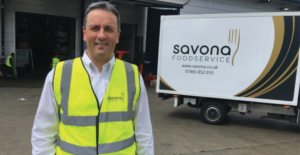As we approach the end of a difficult year, Paul Hill speaks to leading figures at foodservice wholesale companies to find out what they’ve learnt from this unique 12 months:
 Tom Mathew, director, Dunsters: It’s been the most challenging year since our foundation in 1963. The whole industry was hit on almost all fronts and left without sector specific support and we were no different. In terms of learning we have learnt a lot. Interestingly, much of these learnings we were already aware of. Looking at it now, we thought we were agile but perhaps we were not as agile as we could have been and we were guilty of putting off some difficult decisions to a future date. The huge impact of Covid-19 was that it has turbo-charged us and amplified our conviction and commitment to continue evolving. I also think Covid-19 has provided an opportunity for employees to step-up and show their commitment to the business and we have had many fine examples of this. We are committed to continuing our progress to create more opportunities for our team.
Tom Mathew, director, Dunsters: It’s been the most challenging year since our foundation in 1963. The whole industry was hit on almost all fronts and left without sector specific support and we were no different. In terms of learning we have learnt a lot. Interestingly, much of these learnings we were already aware of. Looking at it now, we thought we were agile but perhaps we were not as agile as we could have been and we were guilty of putting off some difficult decisions to a future date. The huge impact of Covid-19 was that it has turbo-charged us and amplified our conviction and commitment to continue evolving. I also think Covid-19 has provided an opportunity for employees to step-up and show their commitment to the business and we have had many fine examples of this. We are committed to continuing our progress to create more opportunities for our team.
BW Year in Review Series: Buying Groups
Mike Morgan, managing director, Savona Foodservice: It goes without saying that the impact of Covid-19 has affected our business and the whole industry in many ways, not least financially. It was a time for listening, learning and not sitting comfortably. Like many wholesalers, we’ve had to adapt to new services, new processes, new routines, and staff have had to be trained and adapt rapidly. The positive news? We did adapt, and we have a stronger, loyal team as a result of pulling together through an extremely difficult period. This, along with our digital transformation, has enabled a radical improvement to our customer proposition, the aim being to provide a frictionless customer journey. By now we are all well aware of the devastating impact, but what’s important is that we learn and continue to do all that we can to support and work with our customers.
that the impact of Covid-19 has affected our business and the whole industry in many ways, not least financially. It was a time for listening, learning and not sitting comfortably. Like many wholesalers, we’ve had to adapt to new services, new processes, new routines, and staff have had to be trained and adapt rapidly. The positive news? We did adapt, and we have a stronger, loyal team as a result of pulling together through an extremely difficult period. This, along with our digital transformation, has enabled a radical improvement to our customer proposition, the aim being to provide a frictionless customer journey. By now we are all well aware of the devastating impact, but what’s important is that we learn and continue to do all that we can to support and work with our customers.
 Justin Slawson, chairman, Mevalco: “2020 has been an extra-ordinary and exceptionally tough year – our foodservice clients were severely impacted (as was the entire hospitality sector obviously), which of course, had a direct effect on our business. We furloughed 15 members of our team and set about driving change. We temporarily repurposed our business to deal with Covid-19 implications to create direct to consumer home delivery model of product ingredients and hampers, a move which included setting up an online shop and pro-active digital marketing to reach consumers. August and September saw a considerable bounce back, helped in part by the Government’s Eat Out to Help Out scheme. However, the 10pm curfew and other restrictions has had a negative impact and at best we are in for a gloomy winter.”
Justin Slawson, chairman, Mevalco: “2020 has been an extra-ordinary and exceptionally tough year – our foodservice clients were severely impacted (as was the entire hospitality sector obviously), which of course, had a direct effect on our business. We furloughed 15 members of our team and set about driving change. We temporarily repurposed our business to deal with Covid-19 implications to create direct to consumer home delivery model of product ingredients and hampers, a move which included setting up an online shop and pro-active digital marketing to reach consumers. August and September saw a considerable bounce back, helped in part by the Government’s Eat Out to Help Out scheme. However, the 10pm curfew and other restrictions has had a negative impact and at best we are in for a gloomy winter.”
Tim Adams, director of corporate sales and marketing, Bidfood: “Well, it’s a  year that none of us could’ve ever predicted. It’s brought with it some challenges that as an industry we’ve never had to tackle, and albeit still an incredibly uncertain and unsettling time, it really has brought to light the resilience of our industry. We’ve learnt that despite these challenges, the support and willingness of our best team has been instrumental in allowing us to be agile and adaptable in the current climate. From losing 70% of our volume overnight we had to act quickly to look at ways to mitigate as much damage as possible to our business. From the launch of our direct to consumer click + collect and home delivery service, through to the mobilisation of the shield pack initiative. Set-up by the government and facilitated by Bidfood and competitor, Brakes, the teams delivered over five million vital food packages to the clinically vulnerable shielding – the biggest food redistribution scheme since World War II.”
year that none of us could’ve ever predicted. It’s brought with it some challenges that as an industry we’ve never had to tackle, and albeit still an incredibly uncertain and unsettling time, it really has brought to light the resilience of our industry. We’ve learnt that despite these challenges, the support and willingness of our best team has been instrumental in allowing us to be agile and adaptable in the current climate. From losing 70% of our volume overnight we had to act quickly to look at ways to mitigate as much damage as possible to our business. From the launch of our direct to consumer click + collect and home delivery service, through to the mobilisation of the shield pack initiative. Set-up by the government and facilitated by Bidfood and competitor, Brakes, the teams delivered over five million vital food packages to the clinically vulnerable shielding – the biggest food redistribution scheme since World War II.”
 Hugo Mahoney, chief executive, Brakes: “It goes without saying, 2020 has been a tough year, for our business, our colleagues and our customers. Like our hospitality customers, wholesalers have demonstrated resilience and innovation in equal measure. Yet I feel we saw the best from many wholesalers. At Brakes we were quick to adapt to the circumstances, launching direct-to-consumer services, supplying retailers and doing whatever was needed to get supply through to hospitals and care homes. We were particularly proud of the food parcel service to the vulnerable shielded community we operated with Bidfood. We took just nine days to go from conception to a working service, and ended up serving five million boxes. Yet we have also been overlooked on business rate relief despite our markets closing. This shows us how important it is we lobby together more effectively.”
Hugo Mahoney, chief executive, Brakes: “It goes without saying, 2020 has been a tough year, for our business, our colleagues and our customers. Like our hospitality customers, wholesalers have demonstrated resilience and innovation in equal measure. Yet I feel we saw the best from many wholesalers. At Brakes we were quick to adapt to the circumstances, launching direct-to-consumer services, supplying retailers and doing whatever was needed to get supply through to hospitals and care homes. We were particularly proud of the food parcel service to the vulnerable shielded community we operated with Bidfood. We took just nine days to go from conception to a working service, and ended up serving five million boxes. Yet we have also been overlooked on business rate relief despite our markets closing. This shows us how important it is we lobby together more effectively.”








